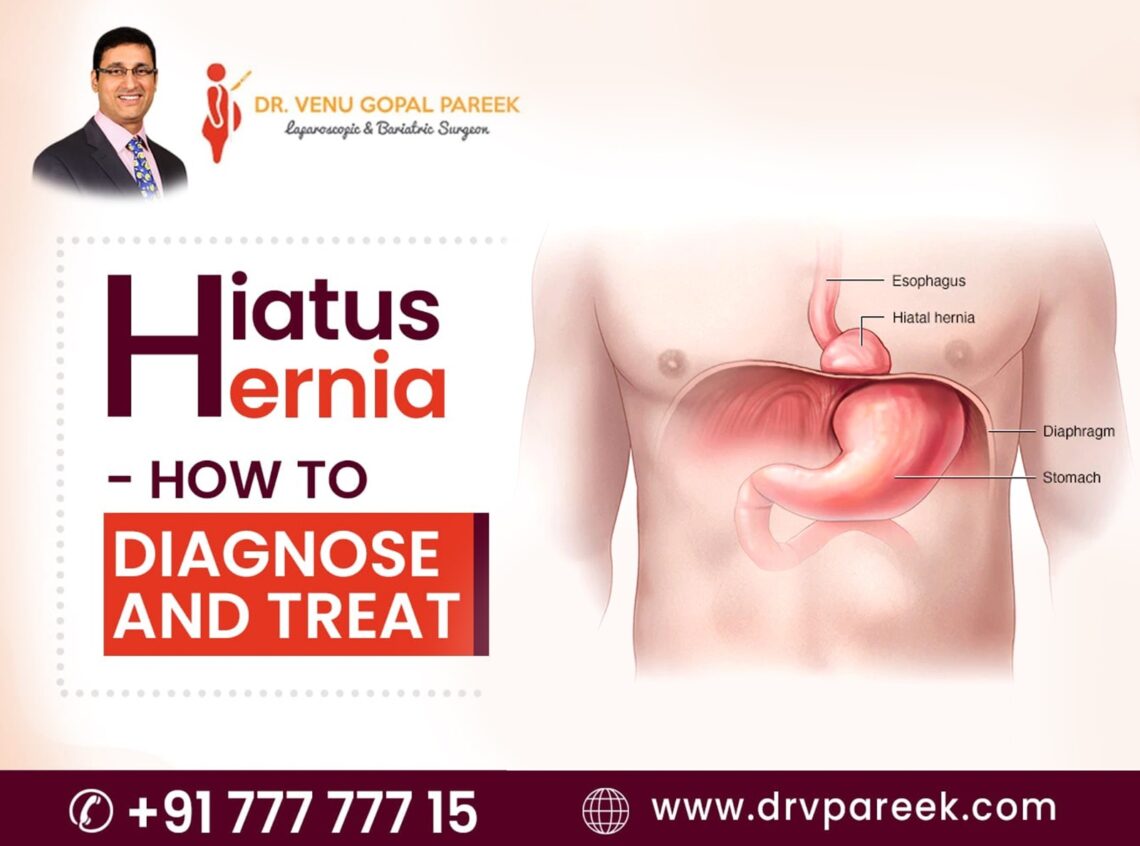
Hiatus hernia is a medical condition often called a hiatal hernia. In this condition a portion of the stomach is displaced upward into the chest cavity through the diaphragm opening called the esophageal hiatus. When this happens it causes a bulge or protrusion. The diaphragm is a dome-shaped muscle that divides the chest (thoracic) cavity from the abdominal cavity. The esophageal hiatus is a tube that carries food from the mouth to the stomach.
Hiatus hernias are of two different types:
Sliding Hiatus Hernia: This type of hernia is more common. In this condition, the lower part of your esophagus and a part of the stomach is displaced upward through the esophageal hiatus into the chest cavity. It may slide back and forth, based on your body position.
Paraesophageal Hiatus Hernia: Although a less frequent type of hernia, it is more complicated. This kind of hernia occurs when a portion of the stomach squeezes through the hiatus and rests next to the oesophagus. It may result in complications like strangulation or your stomach may lose its blood flow to the herniated portion.
Symptoms of Hiatus Hernia
Most of the time, Hiatus hernias go symptomless and are often found during general medical tests for some other health conditions.
However, some people with hernia might have various symptoms as follows:
- Heartburn from gastroesophageal reflux disease (GERD)
- Acid reflux – food or liquid flows back from your stomach into your mouth
- Pain in chest
- Pain in the upper abdomen
- Bloating
- Excessive burping or belching
- Difficulty swallowing, especially hot drinks
- Bad taste (Acidic taste) in mouth
- signs of asthma
- bad breath and dental problems
- A feeling of having a lump in the throat
- Stomach upset
- Frequent vomiting
- Breathing problems
- Persistent coughing at night
- A feeling of fullness after eating
- Can’t poop or pass gas
Causes behind developing hiatal hernia
The exact cause of hiatal hernia is not clear, but there are several factors that may lead to the development of this condition.
Excessive pressure in the abdominal cavity is the primary reason for developing hiatal hernia. Some of the causes of increased abdominal pressure include:
- Diaphragm changes
- Lifting heavy objects
- Chronic cough
- Pregnancy
- Chronic Constipation
- Injury or trauma to the area
Some of the risk factors and other causes are:
- Increasing age might make the muscles and tissues in the diaphragm weak
- Obesity – Being obese can increase abdominal pressure and also makes the muscles and tissues weak around the diaphragm.
- Congenital (present at birth) or acquired weakness of the diaphragm
- Smoking weakens the lower esophageal sphincter (LES)
- Connective tissue disorders like Marfan syndrome can make the tissues in the diaphragm weak
It’s very important to keep in mind that only those with the risk factors mentioned above will develop a hiatal hernia, and hernias might occasionally develop for unknown reasons.
Diagnosis of a hiatal hernia
Usually, a hiatal hernia is diagnosed using a combination of procedures like a physical exam, medical history, and other diagnostic tests.
- Medical history, which includes previous surgeries and any history of gastrointestinal issues in your family.
- A physical examination is done to diagnose signs of a hiatal hernia or other complications related to it.
- Imaging tests like chest X-ray, Barium swallow, and endoscopy confirm the presence of a hiatal hernia, and they also provide the size and type of hernia present.
- Esophageal manometry is to check the pressure in your oesophagus while you swallow.
- pH test is done to estimate the acid levels in your esophagus.
It is very important to consult a doctor for a thorough evaluation if you have any symptoms that indicate the presence of a hiatal hernia. If the diagnosis confirms the presence of a hiatal hernia, your doctor will suggest suitable treatment options depending on the severity of the hernia and the symptoms associated with it.
Treatment for hiatus hernia
Treatment for a hiatus hernia is not the same for everyone with this condition. It varies from one person to another depending on the severity of symptoms and the type of hernia. It may range from lifestyle modifications to surgery if required.
Here are some treatment options to treat hiatal hernia:
Lifestyle Modifications
- Eat small portions of meals frequently instead of large meals to reduce abdominal pressure.
- Avoid foods that trigger or worsen acid reflux.
- After eating, avoid lying down or bending over.
- Sleep in a slightly reclined position to reduce nighttime acid reflux.
Medications
- Antacid medication can help balance stomach acid and temporarily provide relief from heartburn and acid reflux.
- H2 blockers help reduce stomach acid production.
- Proton pump inhibitors (PPIs) are used in more severe cases of acid reflux-related hiatal hernia.
Losing excess weight, avoiding smoking and alcohol, and practicing proper posture and lifting techniques can also help reduce the symptoms and risk of developing a hiatus hernia.
Surgery for hiatus hernia
Most paraesophageal Hiatus Hernia cases require surgical intervention so that your stomach doesn’t become strangled. Sliding hernias may also need surgery if they become complicated, like bleeding, becoming large, strangulated, or inflamed.
The goal of surgery is to fix the hernia and prevent the stomach from moving into the chest cavity.
This surgery involves moving the displaced stomach into its place and reinforcing the hiatus. Laparoscopy is the most common surgical option used to treat hiatal hernias. This is a minimally invasive surgical procedure in which the surgeon makes a few smaller cuts to insert the necessary tools to fix the hernia. The risk of infection and pain is very low. Less scarring and faster recovery are additional benefits of the surgery. You will be discharged on the same day, and within 2 weeks you can probably resume your regular work.
If you think you are at risk of developing a hiatus hernia or if you notice any related symptoms, consult Dr. V Pareek, one of the best laparoscopic surgeons in Hyderabad. He will perform a complete evaluation of your condition and suggest the necessary treatment. Early diagnosis and the right treatment is a great way to ease the symptoms and reduce the risk of complications associated with this Hiatus Hernia.







